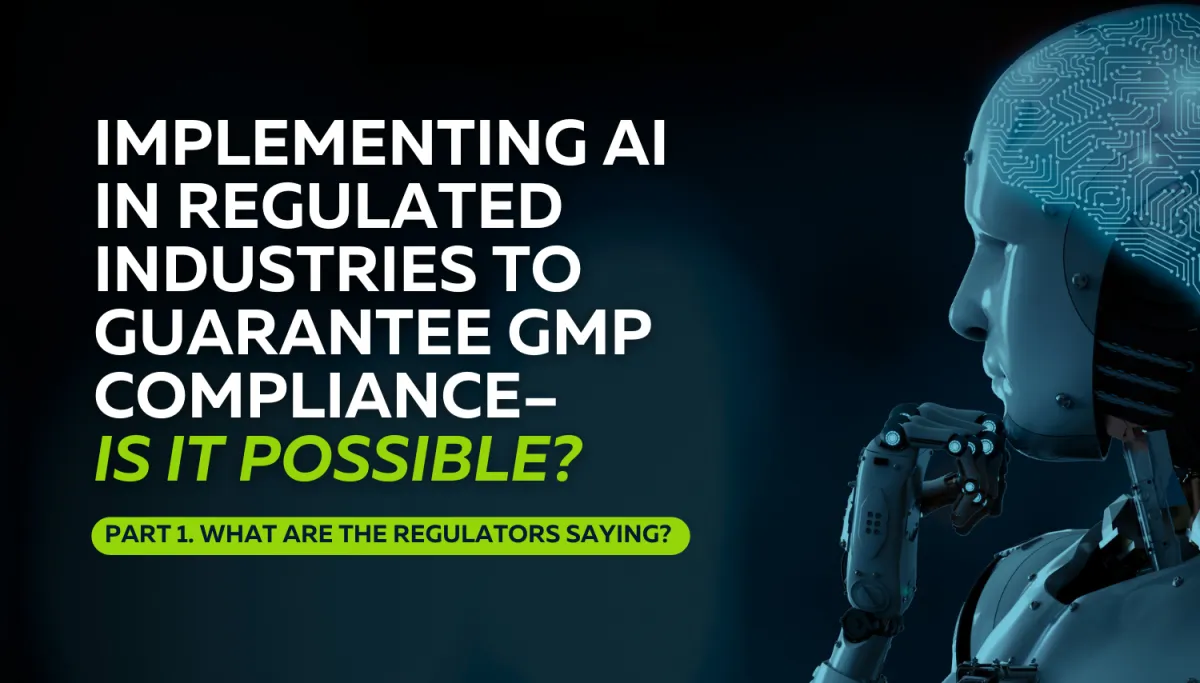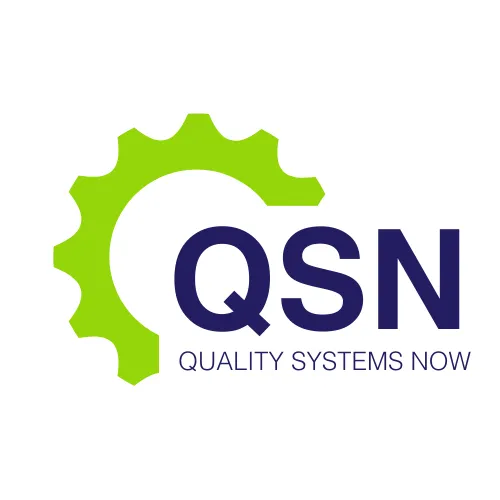Latest News

Implementing AI in Regulated Industries to Guarantee GMP Compliance – Is it Possible? Part 1. What are the Regulators saying?
Artificial Intelligence – it’s causing a lot of discussions at the moment!
Social media, advertising, marketing, website content, doctored graphics in the public eye – since the launch of Chat GPT, it seems like we are now being bombarded with AI-generated information, with every app or software platform having the option to turn on the AI content generator.
But does it have a place in regulated industries like pharmaceuticals, medical devices or biotech to provide faster diagnoses and better therapeutic products?
I’m not talking about using AI for company marketing, social media posts or website content, though it is pretty easy to identify this stuff.
But could it be used for QMS and compliance documentation – procedures, reports, records – set up with a company-specific AI algorithm?
Or for analysing complex data sets like those required to control advanced manufacturing?
How do you demonstrate compliance with an AI model like machine learning where it evolves over time?
And then there are medical devices that include AI as part of the product itself, especially software as a medical device – what’s safe for patients and their personal data.
This article is one of three, that will look at the current state of play and some of the key questions manufacturers and regulators are asking about AI in the regulated space.
So, what are the regulator’s saying?
FDA Guidance on AI in Pharmaceutical Manufacturing
The FDA CDER has published a discussion paper, Artificial Intelligence in Drug Manufacture, to pose questions to industry, potential uses for AI in advanced manufacturing, and the potential regulatory hurdles that will need to be address.
The paper proposes the following potential applications for AI in pharmaceutical manufacturing:
Process design and scale-up: AI models, including machine learning, could be used to quickly identify optimal processing parameters and scale-up processes.
Advanced Process Control (APC): Allows dynamic control of manufacturing processes, including predictive functionality based on real-time sensor data. These AI techniques are already being considered by some manufacturers.
Process monitoring and fault detection: AI techniques could be used to monitor equipment and detect changes from normal, ‘in spec’ operation, triggering maintenance and reducing process downtime.
Trend monitoring: AI could be used to examine all manner of large volumes of text or data to identify cluster problem areas, potential improvements or process capability monitoring – consider deviations, complaints, customer feedback or pharmacovigilance data, test results, product quality reviews, process capability monitoring, and improved root cause identification across complex data sets.
The discussion paper also goes into further depth for areas of consideration associated with AI that will need to be addressed to meet current GMP expectations. These are summarised from the FDA paper below; refer to Artificial Intelligence in Drug Manufacture for detailed discussion:
Cloud applications affecting oversight of pharma manufacturing data and records – even though software that controls execution may be close by the manufacturing equipment, other functions that are not time critical may be located in the cloud. Data integrity and data quality, and quality agreements with third-party providers would need to address risks associated with AI.
Increase in the amount of data generated during manufacturing that impacts existing data management practices – digitization of manufacturing controls will likely create more information about the process and product, both in terms of frequency and type of data. How this impacts data integrity and data retention with the data management system, particularly with respect to storge, security and retrieval will need to be addressed to reduce risks.
How the application of AI in manufacturing is subject to regulatory oversight – Companies will need to understand the applications of AI in manufacturing operations that are subject to regulatory oversight and GMP compliance e.g. monitoring and maintaining equipment, continuous improvement, scheduling, supply chain logistics, characterisation of raw materials etc.
Standards for developing and validating AI models for process controls and release testing – There are limited industry standards and guidance for developing and validating AI models that impact product quality, particularly as the robustness of the data shapes the decisions made by an AI model. There are challenges here to avoid unintended biases during model development and validation.
Continuously learning AI systems that adapt to real-time data may challenge regulatory assessment and oversight – AI models with continuous learning, evolve over time and do not fit our current approach of ‘develop/validate/implement/update’ lifecycle for managing manufacturing processes. How and what will be acceptable to demonstrate ongoing GMP compliance?
EU Artificial Intelligence Act
In March 2024, the EU approved the Artificial Intelligence Act, “to ensure safety and compliance with fundamental rights while boosting innovation”. While this new legislation is not specific to pharmaceutical manufacturing, it does pave the way for specific guidance for therapeutic goods and advanced manufacturing.
The premise of the law addresses the different applications of AI, particularly for social and human rights risks, including:
Banned applications
Obligations for high-risk systems
Transparency requirements
Measures to support innovation.
MHRA AI Advances
The UK’s MHRA has several initiatives looking at AI and therapeutic products, including:
The AI-Airlock – a regulatory sandbox that provides a regulator-monitored virtual area for developers to generate evidence for the use of AI in their technologies. See the announcement here.
Good Machine Learning Practice for Medical Device Development: Guiding Principles - The FDA, Health Canada, and the MHRA have jointly identified 10 guiding principles that can inform the development of Good Machine Learning Practice (GMLP) – another ‘GxP’ acronym to add to the collection! See the guidance here.
Predetermined Change Control Plans for Machine Learning-Enabled Medical Devices: Guiding Principles - FDA, Health Canada, and MHRA jointly identified 5 guiding principles for predetermined change control plans. These principles draw upon the overarching GMLP guiding principles, in particular principle 10, which states that deployed models are monitored for performance and re-training risks are managed. See the guidance here.
Bottom Line! AI Is Complex Software – The Same GMP Software Compliance Requirements Currently Apply!
It is very early days for the adoption of AI in the therapeutic product or manufacturing space. But the ‘cat is out of the bag’ now, it’s only a matter of time before both products and manufacturing practices are impacts by AI models.
Look out for Part 2 of this article, looking at the new ISO standard for AI – ISO42001.
